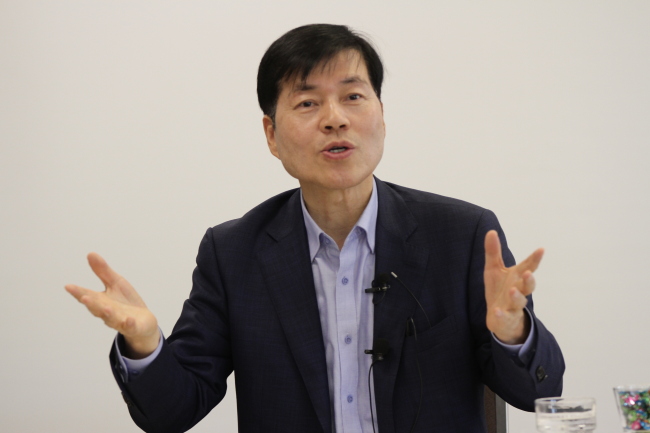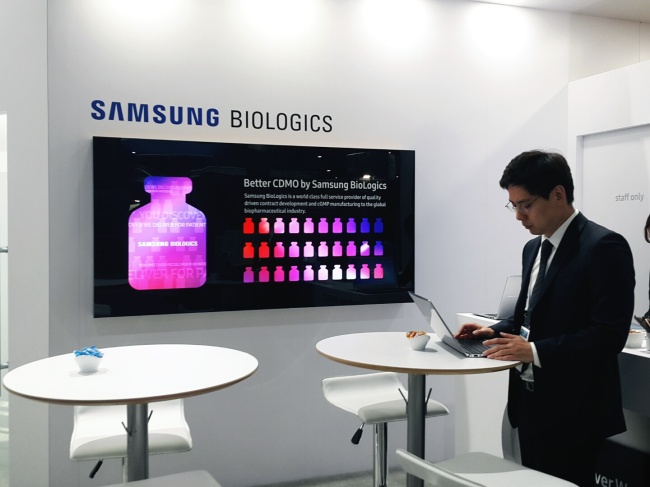[Herald Interview] Samsung BioLogics to start drug development service
Chinese CMOs not a threat in the next 10 years, says CEO
By Sohn Ji-youngPublished : June 21, 2017 - 19:04
SAN DIEGO -- Samsung BioLogics, the contract drug manufacturing arm of South Korea’s Samsung Group, is planning to provide development support services to small-sized pharmaceutical firms, as it looks to expand the scope of its business.
Samsung BioLogics CEO Kim Tae-han said Tuesday local time that the company would “extend its business scope into the field of (drug) development services” to widen its portfolio beyond producing biologic drugs on behalf of clients.
“Now that we’ve secured global competitiveness in contract manufacturing, we’re extending into the realm of development services,” Kim said in an interview with the Korean media on the sidelines of the ongoing 2017 Bio International Convention in San Diego.
Samsung BioLogics CEO Kim Tae-han said Tuesday local time that the company would “extend its business scope into the field of (drug) development services” to widen its portfolio beyond producing biologic drugs on behalf of clients.
“Now that we’ve secured global competitiveness in contract manufacturing, we’re extending into the realm of development services,” Kim said in an interview with the Korean media on the sidelines of the ongoing 2017 Bio International Convention in San Diego.

Hence, Samsung has repositioned itself as a contract development manufacturing organization or CDMO. It is an extension from its previous label as a contract manufacturing organization, or CMO.
As a CDMO, a business model taken on by rivals like Lonza and Boehringer Ingelheim, Samsung BioLogics will offer more comprehensive services that extend from early drug development all the way to commercial manufacturing.
It can produce a small batch of a drug under development by a client for early-stage clinical trials. And if the trials are successful, it can provide the client with further subsequent development processes such as selecting the best cell lines for formulating the particular drug and optimizing its production and scale-up processes for commercial sales.
Samsung is targeting mainly small-sized drugmakers with just 20 to 30 employees that may find it difficult to handle such tasks entirely on their own, explained the firm’s vice president of corporate business operation, Yoon Ho-yeol.
The Samsung subsidiary is already receiving multiple inquiries and is engaging in talks with multiple companies about striking deals on the development services front, though it cannot reveal specific details at the moment, the 60-year-old CEO said.

According to Kim, Samsung BioLogics has been preparing for its transition into a CDMO. Earlier this year, it added two 1,000-liter bioreactors to its second plant designed to produce small batches of drugs used for clinical trials.
Since last year, Samsung has also been working to hire new talent who can handle the development part of its business, Kim said, adding that its existing manufacturing and science and technology team is already qualified to carry out such services as well.
In addition, Kim said that new drug development remains on the table for Samsung BioLogics. However, the firm has not decided yet the type of drug or disease it would target and the methods under which it would pursue new drug development.
“We have always continuously reviewed the possibility of new drug development. However, we have not been able to yet finalize what type of drug to pursue that would give us a competitive edge in a relatively short period of time,” Kim said.
“There are countless disease areas, drug types, business models and licensing deals that we can consider. We are continuing to consider the best and most strategic options, though we have yet to arrive at a conclusion.”
Listed on Korea’s main bourse Kospi, Samsung BioLogics currently produces live cell-based biologic drugs on behalf of clients including but not limited to Bristol-Myer Squibbs and Roche.
The Songdo-based company is spearheading Samsung Group’s push into biopharmaceuticals as the Korean tech conglomerate seeks success in new, promising industries beyond its flagship electronics business.
Since its foundation in 2011, Samsung BioLogics has risen up as a formidable player in the global drug manufacturing business. Upon the completion of its third plant in Songdo, Samsung BioLogics’ net production capacity will rise to 362,000 liters, making it the world’s biggest contract drug manufacturer by capacity.
When asked about encroaching competition from Chinese drug CMOs, the Samsung BioLogics chief said that that they would not become formidable rivals in the near future.
“Though things may be different in the long run, Chinese CMOs will not pose a threat in the next 10 years,” Kim said. “There are currently no Chinese CMOs with a production capacity exceeding 10,000 liters, not to mention the difficulty of meeting the US FDA and Europe’s EMA stringent quality guidelines.
In addition to drug manufacturing, Samsung BioLogics has two subsidiaries, Samsung Bioepis and Archigen Biotech, dedicated to the development of biosimilars, which are cheaper, near-replicas of biologic drugs that have lost patent protection.
By Sohn Ji-young, Korea Herald correspondent (jys@heraldcorp.com)







![[KH Explains] Hyundai's full hybrid edge to pay off amid slow transition to pure EVs](http://res.heraldm.com/phpwas/restmb_idxmake.php?idx=644&simg=/content/image/2024/04/18/20240418050645_0.jpg&u=20240419100350)






![[From the Scene] Monks, Buddhists hail return of remains of Buddhas](http://res.heraldm.com/phpwas/restmb_idxmake.php?idx=652&simg=/content/image/2024/04/19/20240419050617_0.jpg&u=20240419175937)

![[KH Explains] Hyundai's full hybrid edge to pay off amid slow transition to pure EVs](http://res.heraldm.com/phpwas/restmb_idxmake.php?idx=652&simg=/content/image/2024/04/18/20240418050645_0.jpg&u=20240419100350)

![[Today’s K-pop] Illit drops debut single remix](http://res.heraldm.com/phpwas/restmb_idxmake.php?idx=642&simg=/content/image/2024/04/19/20240419050612_0.jpg&u=)